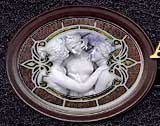Literary Commentary: Brief Notes on Pope's "Essay on Criticism,"
(with Briefer Notes on "On A Lady Who P---st At The Tragedy Of Cato")
I am aware of how well-quoted Alexander Pope is; from his wisdom we know that a "little learning
is a dangerous thing," that "fools rush in where angels fear to tread," and we are familiar with
the concept of "damning with faint praise" (reiterated by my own literary hero Tolkien, spoken
from the mouth of a dragon no less). So, while one can rightfully admire the great and perfect
length and famously formal structure of his "Essay on Criticism," for me it makes for eye-blurring
reading. Pope rarely employs enjambment in his heroic couplets: most lines are terminated at the
point of the rhyme with punctuation. It makes for an excruciatingly regular trot, but rarely a
canter or a gallop.
I even went so far as to copy and paste the essay to see if he had used the word "Wit" in such a
way as to position it in a special fashion - say, in every possible syllabic place in his
pentameter (the results of which is: in forty-eight occurrences of the word "Wit," almost
invariably it appears at the second, stressed half of an iambic foot, except for five exceptions,
which were usually trochaic... so, my answer is "no, he didn't quite").
This is not to mock the man's work! His ability to put words together in such memorable ways is
worthy of much (non-faint) praise. I laughed aloud at his line:
A needless alexandrine ends the song,
That like a wounded snake, drags its slow length along.
... which so cleverly uses that very hexameter to illustrate his point.
Therefore, I was happy to take a break from the endlessly marching legions of couplets and locate
a clearer, briefer example of Pope's wry Wit, reading his ten-line piece "On A Lady Who P---st at
the Tragedy of Cato."
1 While maudlin Whigs deplor'd their Cato's Fate,
2 Still with dry Eyes the Tory Celia sate,
3 But while her Pride forbids her Tears to flow,
4 The gushing Waters find a Vent below:
5 Tho' secret, yet with copious Grief she mourns,
6 Like twenty River-Gods with all their Urns.
7 Let others screw their Hypocritick Face,
8 She shews her Grief in a sincerer Place;
9 There Nature reigns, and Passion void of Art,
10 For that Road leads directly to the Heart.
I appreciate Pope's stance on bipartisan politics, seeing how people on both the Whig and Tory
sides of the early 1700s claimed the famous play "Cato" as their own. While it is evident that
Pope leaned more to the side of the Tories at the time, he could see past the moral disposition
of the play, which brought so many people to tears, and ridiculed both excessive lachrymosity and
the use of literature to serve partisan political needs. The poem also mirrors in a small way his
attitudes toward criticism, in that Nature is the true source of artistic beauty, alongside which
the works of Men must but imitate.
It is suggested in a rather sardonic way, in that a rush of urine (and what a rush! He compares
it to the ever-pouring urns of river gods) is more sincere than the hypocritical weeping of the
audience, but he gets his point across. I wonder why he settled on the name "Celia" as the lady
in question; aside from the fact that he used the name in several of his poems, the word is
derived from a Roman family name which means "Heaven" and a Latin name meaning "blind." Could it
be that Pope insinuates that Celia's deluge is like Heaven's, or that Heaven and Nature are blind
to political maneuverings?
David Elsensohn, May 2005
Return to Essays
|

